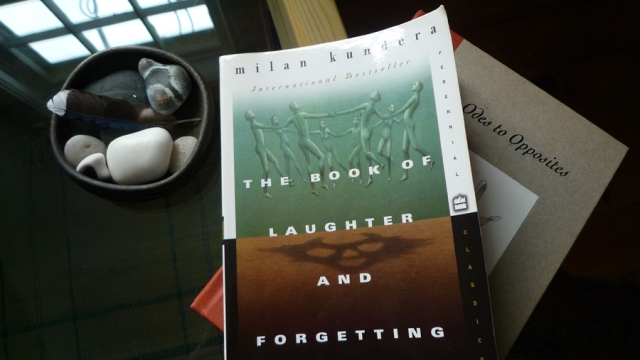In the late 1970s, Milan Kundera – in the cynical equivalent to Joseph Beuys’ mantra, “We are all artists!” – bemoans the advent of hack writers:
The irresistible proliferation of graphomania among politicians, taxi drivers, childbearers, lovers, murderers, thieves, prostitutes, officials, doctors, and patients shows me that everyone without exception bears a potential writer within him, so that the entire human species has good reason to go down into the streets and shout: “We are all writers!”
In the second decade of the new millennium, the potential for all of us to be heard has increased exponentially through social media. A mania for writing stems, according to Kundera, from social isolation, excess leisure, and “the absence of dramatic social changes in the nation’s internal life.” All this comes from and leads to “that absence of vital content, that void” – an emptiness of meaning in our lives and the universes we might subsequently create through our writing.
Yet, Kundera’s concern over the profusion of texts without content is no less significant than his despair over the fate of oppositional voices: “Those who have emigrated […] and those who were reduced to silence and driven from their jobs […] are disappearing like a procession moving away into the fog, invisible and forgotten.” These are two sides of the same imbalance – in which power is maintained through a distribution of privileges rather than the establishment of human rights – and any serious writer is forced to consider to what end does she direct her attention. Though her purpose may feel significant, does it open and extend connections?
Have we forgotten how to listen to the stories of others? For Kundera, the impulse to garner attention leads to a failure of recognition: “One morning (and it will be soon), when everyone wakes up as a writer, the age of universal deafness and incomprehension will have arrived.” This would be a world of revisionism, in which we rewrite the past rather than shape a future: “The future is only an indifferent void no one cares about,” as Kundera describes it. How, then, do we divert this indifference? It begins by the creation of opportunity rather than need and it entails listening.
It also involves a question of belonging. Where can I make a difference? The art world could be represented by a series of concentric rings much like the Olympic logo – bold, collective, and interconnected – but often seems more like the closed circles of humanity described by Kundera in The Book of Laughter and Forgetting. Once one steps out of the circle (assuming one has ever been included within one) the hands lock and re-entry becomes impossible. So, interestingly, after years of seeking opportunity, both for others and myself, through Shifting Connections, I discover a line of connection not through art but via philosophy.
I am both honored and humbled by an invitation to participate in the Institute of Critical Philosophy as a faculty member of the Global Center for Advanced Studies (GCAS). I share with them an interest in critical inquiry, rigorous investigation, alternative approaches, and rhizomatic connections. Above all, we share a concern for and an interest in those who are disappearing like a procession moving away into the fog, invisible and forgotten. I take inspiration from the boldness of individuals such as Edward Snowden and Pope Francis who speak plainly but emphatically for the sake of languages dying, citizen rights undermined, human and environmental resources taxed to their limit, and those silenced and disappearanced through a disregard for human rights; in sum, for the sake of a just and open society.
I also take inspiration from artists like Laura Poitras, Hito Steyerl, and Raqs Media Collective who serve as both conduit and motivator for voices beyond their own. And there are others…the point is to become attentive not to garner privilege but to widen opportunity. As artist Pamela Yates has emphasized in her film Granito (2011): to contribute is often an anonymous yet influential effort, which, like a grain of sand, forms part of a larger purpose. I look forward to contributing granularly to the Institute of Critical Philosophy to contest universal deafness, incomprehension, and an indifferent future as well as to open passages to new and Shifting Connections.




Congratulations on taking on this new challenge as a faculty member with the Institute of Critical Philosophy. This new connection promises to be both stimulating and nurturing.
MANY THANKS!